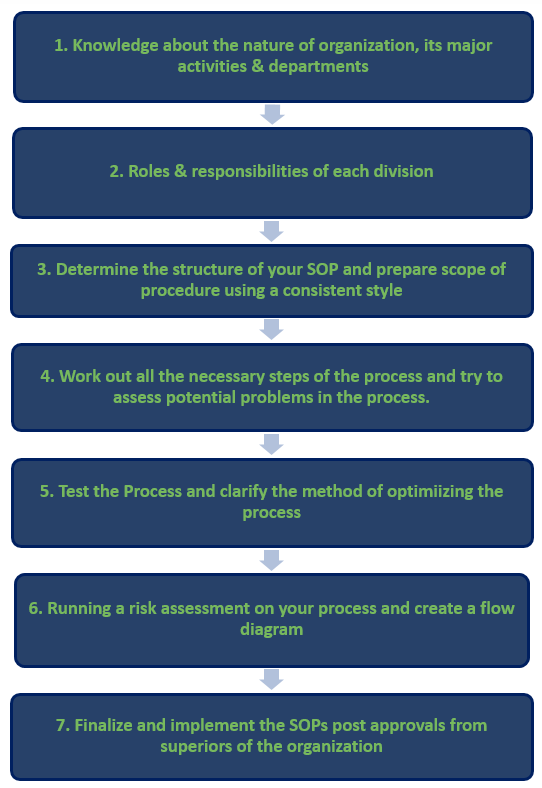Standard Operating Procedure
- Introduction
- Standard Operating Procedures (SOPs) are the documented processes that an organization has consisting of a set of step-by-step instructions to help the employees within its organization carry out its routine operations with ease. Normally, SOPs are used demonstrate compliance with the regulation or operational practices and to document how tasks must be completed within an organization.
- Normally, everyone within the organization wants to perform a specific activity in a “right manner”. However, everyone’s version of that “right manner” is likely to be somewhat different. This means that how a particular task is to be completed is likely to vary according to who is undertaking that task. The most effective and desirable way to get that task done in a timely and an appropriate manner and to make the rules clear for everyone to follow is by creating a Standard Operating Procedure.
- Thus, SOPs are an effective way to communicate a specific activity or changes in the way your organization operates to your employees.
- Case- Study
BH Group is a major food manufacturer was opening a new packaging facility with an entirely new workforce with little to or no experience in the food industry. The CEO of BH Group, Mr. Ravi was concerned with the potential for undue delays and inefficiencies in operations when the plant opened because they do not have a Standard Operating Procedure i.e. documented procedures or trainings.
Since, the organization had a good brand image build over the years, Mr. Ravi did not wanted to have any unwanted errors arising due to miscommunication or inefficiencies. He, therefore approached MASD & Co
who are experts in the field of drafting of SOPs for the organization in order to ensure smooth start-up of all the packaging lines when the plant officially opens.
MASD & Co initiated the process for drafting of various SOPs by understanding the on-going activities, operations & procedures followed by the organization and started discussions with one key person from each position of the company in order to identify the best practices & processes followed within the company. After gathering the information from the relevant stakeholders, post completion of all the relevant steps, MASD & Co drafted various SOPs , and training materials as required for the operation and maintenance of the equipment, best practices, food handling regulations and company standards & policies.
Furthermore, to ensure that the new-employees were properly trained using the SOPs and work instructions, MASD & Co created checklists for the trainer to use during on-the-job-training. The checklists listed the applicable SOPs, work instructions, company forms, and equipment for each position. It also provided a list of tasks to explain, demonstrate, and observe for each position.
The entire assignment of drafting and implementation of SOP was successfully completed and rolled out in advance of the plant opening. The CEO of the company attributed his success to the quality of SOPs implemented and training materials as it lead to the following advantages:
i. Protects the organization from knowledge loss:
If the details of your organization processes are stored in a key employee’s head and not in a procedures manual, the loss of the employee can be disastrous. Documentation of job processes survives employee attrition due to retirement and resignation, and allows your organization to carry on as usual. It’s hard to replace an experienced, trained workers , but comprehensive well-written SOPs ensure that your valuable business processes stays with your organization.
ii. Consistency:
This is the core advantage of implementing an SOP within the organization. Through the SOPs, there will be consistencies in the way an individual carries out a particular task or activity. The more consistent a process is from person to person, the less chance there will be quality problems.
iii. Entire organization working in one direction:
SOPs help to better understand the actions in the larger context to the company. Since, the business policies are implemented via SOP, a cycle is created from policy to SOP, SOP to work instructions and output of the work instruction shows the policy is successfully carried out. Hence, the entire organization works in one direction .
iv. Saves on training costs:
SOPs may not be a complete substitute for training based on complexity of the task, experience of employees and various other factors. However, documented procedures are a valuable component and can reduce training time since they act as a roadmap and allows new employees to work independently without excessive reliance on supervisors. Also, if the documented steps mentioned in the SOP enables the new employee to complete the task, the procedures are sound. If any steps are not clear, confusing or not relevant, the SOPs need to be updated.
v. Readiness for Future Growth:
If the organization plans to expand the businesses further, since the SOPs are now available, new employees at new locations can uphold your reputation by using the SOPs to replicate products/services provided at your original place of business.
vi. Simplifies Performance Management:
Since employees know exactly what is expected from them, they can plan their work schedules in order to meet their goals with efficiency. When all employees follow the same processes, it’s an easy matter to measure them against the same standards. This is especially important in cases where high-performing employees are rewarded, and low-performing employees are retrained.
III. Steps to be followed while implementing an SOP:

Conclusion
Every business has a unique market, every entrepreneur has their own leadership style and every industry has its own practices. No two businesses will have an identical collection of SOPs. However, an SOP for an organization will ensure that the organization has a structured quality system and processes in place, qualified employees, and a motivating company culture. SOPs, in their purest form support the right people in the right environment.
SOPs help you to evaluate more than what you’re doing now but also help you decide how to move forward. Creating more structure in your business activities can dramatically improve productivity and reduce costs. Not every organization will benefit from this kind of standardization through implementation of SOPs, but it depends on your organization, the business owner or manager, to determine if there are work processes that can be duplicated every day within your company and if it's worth teaching those processes to employees through SOPs.
Therefore, SOPs aim to achieve efficiency, quality output and uniformity of performance while reducing miscommunication and failure to comply with the industry regulations.
In case you would like to know how can will your organization benefit from an SOP, you can reach us on our below mentioned e-mail ID.
Authors:
CA Aakash Mehta
Partner, MASD
E-mail ID: aakash.mehta@masd.co.in
Poojan Joshi
Associate Consultant, MASD
E-mail ID: poojan.joshi@masd.co.in
Sahil Rathod
Associate Consultant, MASD
E-mail ID: sahil.rathod@masd.co.in


.svg)

